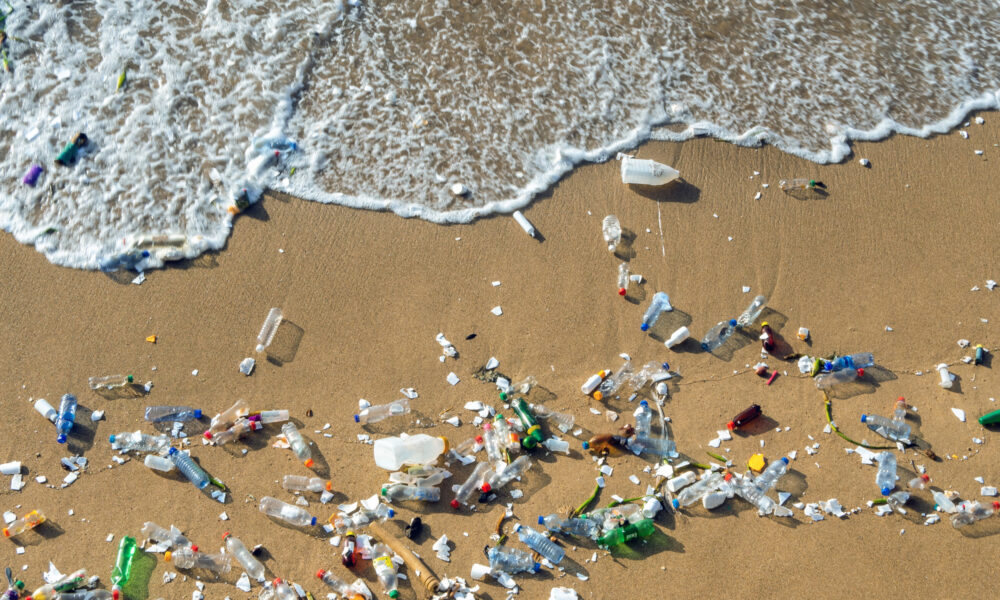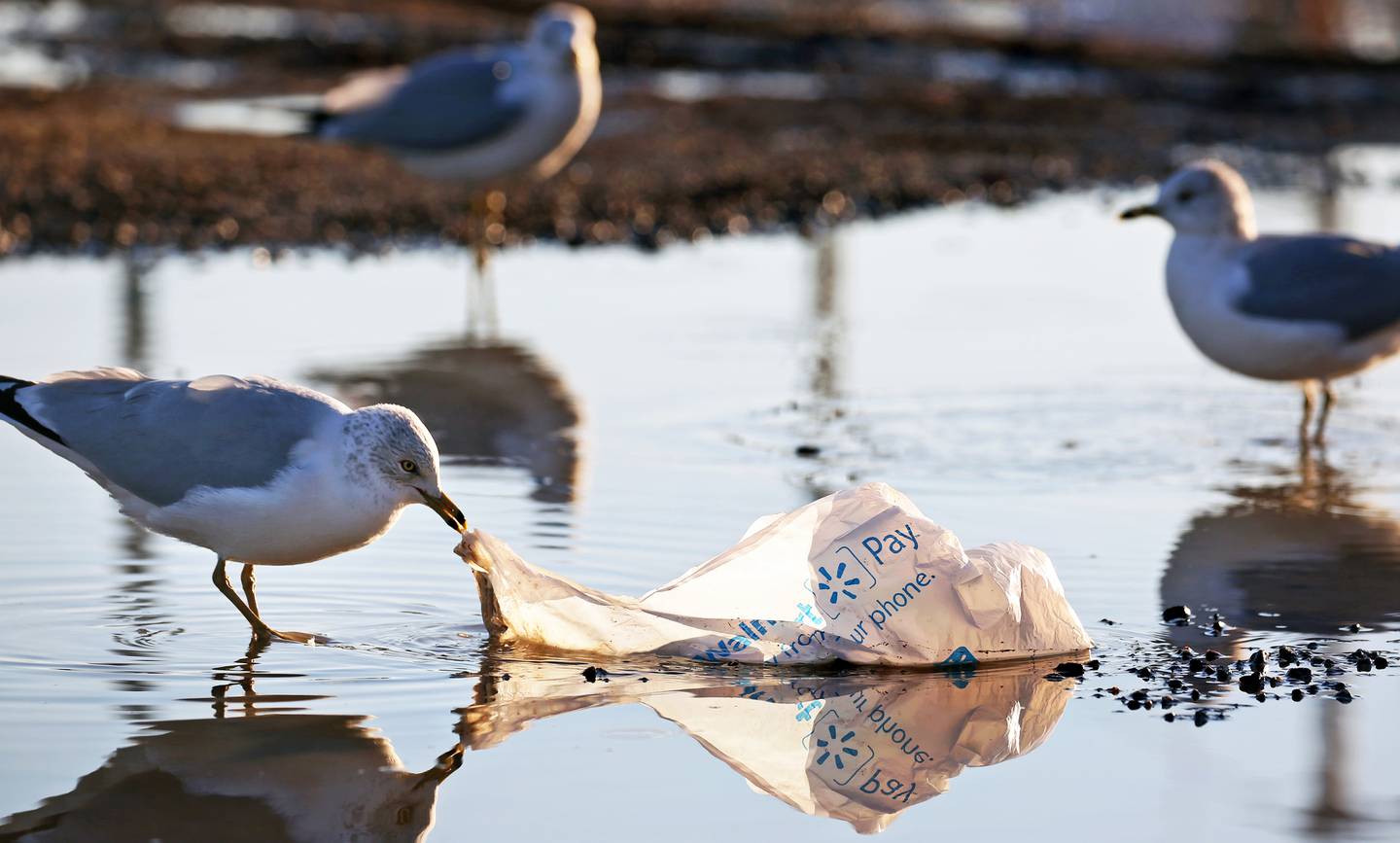The moment may be at hand for Californians to turn the tide on a sea of plastic waste that environmentalists say is destroying life in the ocean, contaminating drinking water and stuffing state landfills.
Already qualified for the November ballot, the California Recycling and Plastic Pollution Reduction Act would force the petrochemical-based plastics industry to make all single-use plastic packaging and foodware items reusable, recyclable or compostable by 2030, while reducing production of them by 25%.
Northern California recycling and waste management giant Recology Inc. put up $3.85 million to get the measure on the ballot. The Corn Refiners Association contributed $250,000 more. The Conservation Action Fund, supported by a half-million-dollar contribution from the Nature Conservancy, is bankrolling the ongoing campaign. And a who’s who of prominent environmental organizations in the state has lent lobbyists and message masters to lead the attack on plastic.
The measure’s supporters describe a frightening scenario of a world overwhelmed by plastic waste — food cups, clamshell containers, straws, bottle-cap sealants and dozens of other single-use items. Plastic trash, the advocates say, now floods the oceans with some 14 billion tons of waste a year that ravages fish and other sea life. On land, plastic refuse breaks down into microscopic particles that are being found pretty much everywhere.
“This isn’t just about marine life,” said Nick Lapis, a lobbyist for Californians Against Waste. “This is being ingested by humans, and we don’t know what the effects of that are. This year, research has come out that showed for the first time that there’s plastic in human blood and human lungs, and there was a study that tested the first bowel movement of newborns, and they had plastic in them. … Babies are literally being born with it in their bodies.”
* * *
Under the terms of the measure, the plastics industry — attached at the hip with the fossil fuels industry, a relationship now under investigation by the California attorney general — would be required to pay a one cent fee for each piece of single-use plastic such as a plastic lid, straw and cup sold.
Most of this money would go into a new California Plastic Pollution Reduction Fund that would “support local public works infrastructure and litter abatement activities, composting, recycling, reuse, and environmental restoration,” according to the initiative. The measure also bans polystyrene foam containers widely used in food services.
Opponents of the initiative say it would cost consumers and state and local governments billions of dollars and lead to tens of thousands of workers losing their jobs. They say that the initiative’s wording does allow producers to pass along costs to consumers, only that they can’t itemize it in a receipt or invoice.
Opposition spokesman Michael Bustamante said the initiative will cost consumers $4.3 billion a year on the penny-per-plastic-item tax.
The California Business Roundtable ($350,000) and the American Chemistry Council ($250,000) are the biggest funders of the opposition campaign, Stop the Tax on Working Families. The Dart Container Corp., of Mason, Michigan, has contributed $256,000 in a donation it made through the Business Roundtable. Dart produces polystyrene foam cups and other food service delivery products; in 2012, it acquired the highly visible Solo Cup franchise, famous to Pong players everywhere. The California Retailers Association, the California Manufacturers & Technology Association and the California Taxpayers Association have signed on with the Roundtable and the chemistry council as sponsors of the opposition committee.
Michael Bustamante, the opposition spokesman, said the initiative will cost consumers $4.3 billion a year on the penny-per-plastic-item tax, or $901 a year for a family of four. He says the state will pay an additional $4.1 billion for expanded recycling and related costs, and that the initiative will require another $500 million to replace “noncomplying materials,” for a total cost of $8.9 billion. Moreover, Bustamante said 40,000 workers will lose their jobs, more than half of whom are Latino.
Bustamante obtained the data from a report put out earlier this year by the Center for Jobs and the Economy, the California Business Roundtable’s research arm. The report, however, said that the initiative would only “affect” the jobs, not eliminate them. The report attributed the figures to 2019 state Employment Development Department data for California packaging employment. Among the 40,159 jobs that the report said would be affected, 7,327 of them are actually in the paperboard and paper bag industry.
In an interview, Bustamante said that “ambiguities” in the wording of the initiative might also expose cardboard, glass, paper and aluminum products to the requirements of the initiative, especially if those materials are intermixed with plastic products.
Bustamante also attacked the initiative’s foremost financial backer, Recology Inc., as “corrupt” and “rotten from the core.” He cited the company’s admission to wrongdoing in two long-running bribery cases that were resolved last year with the company paying $136 million in criminal penalties and rate reimbursements. Bustamante charged that Recology launched the initiative primarily as a result of a decision by the Chinese government in 2017 to stop recycling the world’s plastic waste, including the tonnage it had been importing from Recology.
“You know that these guys were shipping their plastics to China,” Bustamante said. “China was accepting them for free, but when China closed its doors in 2017 and said, ‘We’re not accepting any more,’ Recology needed to find a Plan B, and their Plan B was this initiative.”
An employee-owned company that has collected San Francisco’s trash since 1935, Recology now recycles more than 600 million pounds of materials every year along with some 1 billion pounds of compostable food scraps and yard waste in 127 communities in Northern California, Oregon, Washington state and Nevada.
A Recology spokesman said that the plastics industry “has cynically and dishonestly tried to make Recology the focus” of the campaign “to divert attention away from what is truly at stake.”
“We are not out to destroy the plastics industry, but we must embrace change,” former Recology CEO and President Michael Sangiacomo wrote in a San Francisco Chronicle op-ed when the company launched the initiative drive in 2018.
Company spokesman Robert Reed, in a statement to Capital & Main, said that Recology has “long grappled with the challenges put out by plastic waste” and that it “proudly put up the seed money” for the initiative. Reed said that the plastics industry “has cynically and dishonestly tried to make Recology the focus” of the campaign “to divert attention away from what is truly at stake: voters’ interest in addressing the dangerous proliferation in our environment, our lands and seas, our flora and fauna, and our own bodies.” Reed asserted that the measure “earmarks no money — zero dollars — to Recology.”
Last Sept. 9 Recology admitted to fraud in a complaint filed by the U.S. Attorney’s Office in San Francisco. In a plea deal, the company agreed to pay $36 million in criminal penalties. Also last year, Recology on March 4 settled a case brought by the San Francisco City Attorney’s Office related to the bribery scheme and agreed to pay more than $100 million in rate reimbursements to the city’s residential customers.
According to court documents, the bribery scheme involved two Recology officials who delivered more than $1.1 million in payments to San Francisco’s former public works director, Mohammed Nuru, in exchange for rate increases going as far back as 2013.
Acting U.S. Attorney Stephanie M. Hinds said in a press release that the company is “committed to full cooperation” in the government’s ongoing investigation.
Despite the bad publicity out of San Francisco, initiative supporters have not backed away from Recology. Lapis, the lobbyist for Californians Against Waste, said it has been “a good partner” and called the industry attack on Recology, which is no longer involved in the campaign, “a miscalculation on who they think is driving the ship here.”
* * *
As for the opponents’ allegation that the initiative will cost consumers $4.3 billion, the measure’s supporters are using the figure to bash the plastics industry. They say that the number represents an admission on the industry’s part of the Mt. Everest-sized plastics problem, as well as an acknowledgment that producers have no intention of reducing the amount of nonrecyclable waste that they are pumping out.
At the rate of a penny a piece, the proponents say, the figure suggests the industry is producing and California consumers are throwing away some 430 billion pieces of single-use plastic a year.
“I think what the opposition here is saying with these inflated cost estimates and claims is that they are basically owning up to having no intention of changing their ways or taking responsibility for their products,” said Dr. Anja Brandon, the U.S. plastics policy analyst at the Ocean Conservancy. “They plan to continue business as usual while pushing costs on to consumers, which the ballot measure explicitly prohibits.”
Dart Container Corp. and the American Chemistry Council both promote reuse and recycling on their websites. Brooke Armour Spiegel, vice president of the California Business Roundtable, said in an interview, “The business community is not opposed to recycling and reducing plastic waste. In fact we strongly support it.” Nobody from either Dart or the chemistry council responded to requests for comments. (Dart’s chairman, Kenneth Dart, who is believed to be worth $6.6 billion as of 2013, renounced his U.S. citizenship in favor of Belize to avoid paying taxes, as did his brother, Dart Chief Executive Officer Robert C. Dart.)
“The truth is: The vast majority of plastic cannot be recycled and the recycling rate has never surpassed 9%.”
~ California Attorney General Rob Bonta
Brandon surmised that neither Dart nor the American Chemistry Council are serious about growing what environmentalists call the “circular economy” that other firms, especially those in corn refining, seem poised to pursue. She notes that the plastics industry is deeply connected to the oil industry and views the continued use of petroleum-based single-use plastic as a pathway to profits.
“They see the public’s growing awareness and frustration with single-use plastic pollution as [an] existential [threat] to their business,” Brandon said. “Because, ultimately, getting to a circular economy means not using fossil fuels anymore.”
In April, California Attorney General Rob Bonta’s office served a subpoena on ExxonMobil, the first move in what he said will be an investigation into the petrochemical industry’s alleged misleading of the public about single-use plastic producers’ ability to recycle its products.
“Enough is enough,” Bonta said in a press release announcing the subpoena and the investigation. “For more than half a century, the plastics industry has engaged in an aggressive campaign to deceive the public, perpetuating a myth that recycling can solve the plastics crisis. The truth is: The vast majority of plastic cannot be recycled and the recycling rate has never surpassed 9%.”
* * *
With polls showing state residents overwhelmingly concerned about plastic pollution and ready to do something about it, business groups have recently gone to the table to negotiate their possible legislative accession to a significant plastic waste reduction bill. Talks are underway in Sacramento among business groups, environmentalists and lawmakers, and they must reach an agreement, sources said, or the initiative will go to the voters.
State Sen. Ben Allen (D-Santa Monica), the author of SB 54, a plastic source-reduction measure that has been pending since December 2020, is mediating the talks. Any likely deal would require the industry committing to and financially supporting a significant level of source reduction, a move to replace more plastics with compostable products and increasing the state’s plastics recycling rate to well beyond its current 9% level. In return, the business side wants more certainty regarding what the state’s recycling agency, CalRecycle, can and cannot order, the source said.
On June 14, 21 environmental groups sent a letter to Allen saying that they could not support a compromise proposal that made it into a bill that is now in print. They contended that the revised SB 54 takes away too much of CalRecycle’s authority to develop the initiative’s reduction and recycling programs and gives it to the producers “who have created the problem,” the letter said.
The initiative’s proposed polystyrene ban and its effect on Dart Container Corp. also has emerged as a major issue in the talks, another source said. Although Dart, the big-time polystyrene producer, is not directly participating in the negotiations, the company, besides its $256,000 contribution to defeat the initiative, has, since 2019, contributed $496,000 to 85 lawmakers in the Assembly who ultimately would have to approve any legislative deal, according to initiative proponents.
Neither side is predicting whether a legislative compromise can be achieved. In anticipation of the possibility that there will not be a deal, proponents announced on June 13 that they had retained one of the country’s leading Democratic campaign organizations, Bryson Gillette, to run the fall campaign, if there is one. June 30 is the deadline for the two sides to reach a deal if they want to remove the measure from the Nov. 8 ballot.
Copyright 2022 Capital & Main.
An earlier version of this story identified the California Recycling and Plastic Pollution Reduction Act by an alternative title, the California Plastic Waste Reduction Regulations Initiative.






